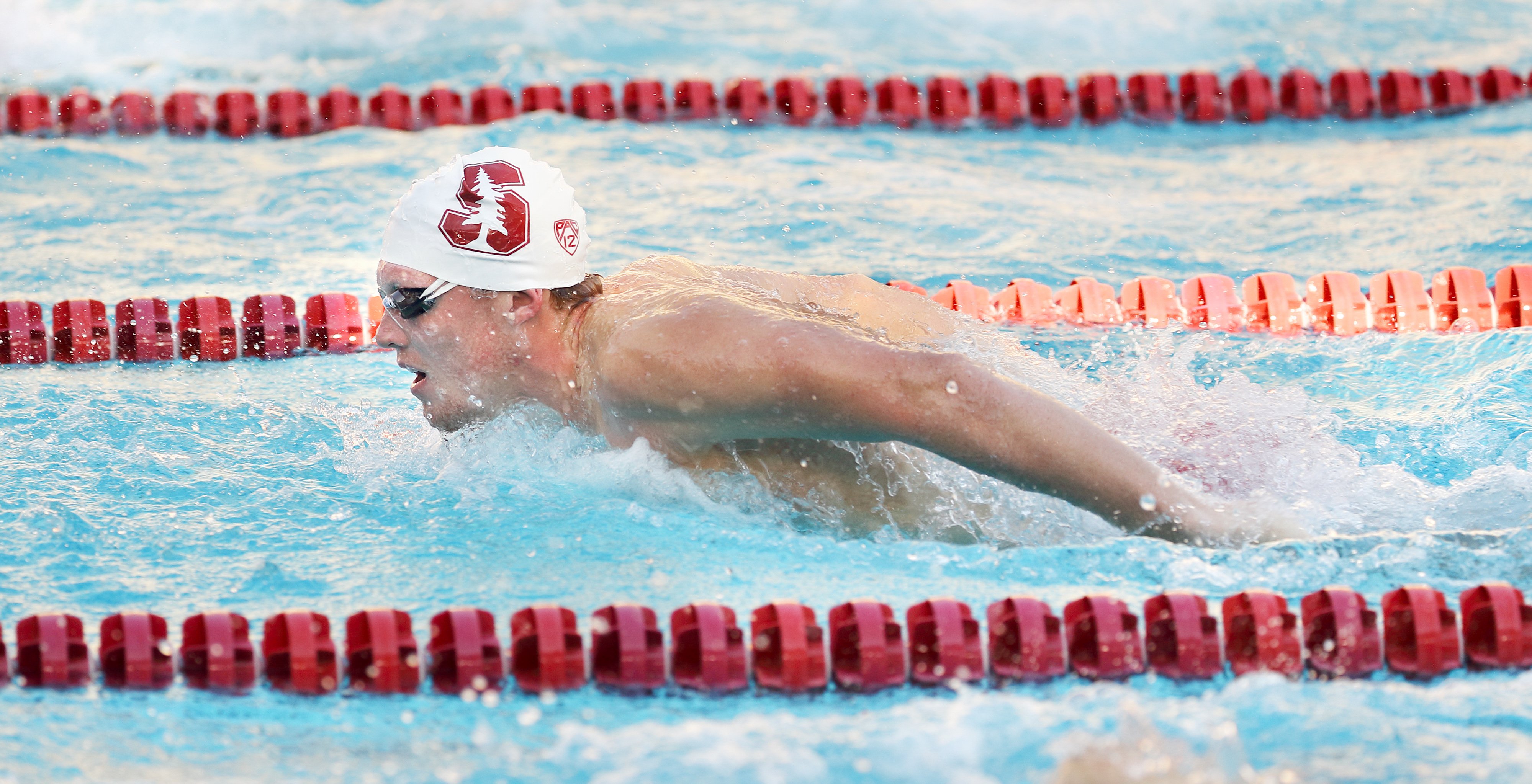Two-time NCAA champion Abrahm DeVine ’19, one of the few openly gay swimmers competing at an elite level, made national headlines last week when he said he was “kicked off the Stanford swim team” because he is gay. DeVine finished his collegiate career at Stanford earlier this year, but he was barred from the University’s pro training group.
“Plain and simple: there are surface level reasons I was kicked off the Stanford swim team, but I can tell you with certainty that it comes down to the fact that I am gay,” he wrote in a Sept. 30 Instagram post.
But while he stands by his Instagram statement, DeVine also told The Daily that his expulsion came after he drank at a Team USA swim meet instead of showing up to support his teammates who were competing, a violation of the National Team’s Honor Code.
“I think that I wrote this entire Instagram post where every sentence is very important, but the only one that people are really focusing on is me calling out Stanford, and that makes my message sound very aggressive and that I’m out for blood, when in reality that is not what I wanted at all,” DeVine said. “I’m here to just say this is a systemic issue.”
Rather than to call out the Stanford coaches’ decision as an explicit act of homophobia, he said that his Instagram post sought to highlight how a homophobic culture within Stanford’s team was already alienating him from the swimming community and presented a broader obstacle to the success of queer swimmers. An important reason why he did not support Team USA at the meet, he said, was because he felt that neither coaches nor athletes on the team respected him and his experiences as a gay swimmer.
“Between coaches and other athletes, I feel there is so much ignorance to what it means to be gay in a sports world that my character is not recognized,” he wrote in a statement to The Daily. “Although I feel I can participate by being silent and non-disruptive, I feel that my identity as a gay man is incompatible with the swimming world,”
Greg Meehan and Dan Schemmel, head coaches for Stanford’s women’s and men’s teams, released a joint statement to swimming news organization SwimSwam earlier this week that defended the “inclusivity and supportiveness” of Stanford’s swimming teams. They maintained that the decision over DeVine was unrelated to his sexuality but did not respond to Daily inquiries on the specific reasons DeVine was not invited to train this fall.
Six former and current men’s swim team members either declined or did not respond to The Daily’s request for comment.
In his Instagram post, DeVine wrote that he wanted to “call out” the homophobia he had experienced as an athlete and advocated for “changing some of the homophobic aspects of the athletic culture that exists today.” He told The Daily that explicitly homophobic slurs were commonplace among team members’ conversations before he came out to the team his junior year. Even then, he said, teammates and coaches made little effort to understand how the team’s heteronormative culture prevented him from feeling comfortable expressing his sexuality.
“What I really wanted was some thought and reflection on where [the homophobia] was coming from, on why you think gay equals bad,” he told The Daily. “And I think what actually happened was like, ‘Oh shoot. We can’t really say these [slurs] anymore. We might still think it’s kind of funny, but we’re going to censor ourselves.’”
In describing his perceived experience of homophobia on the team, Devine recalled coaches appealing to masculine stereotypes to motivate swimmers and teammates mocking topics such as fragility and privilege as the concerns of social justice warriors. While coaches and teammates publicly supported gay rights, DeVine said that his coaches would get defensive and unwilling to listen to him when he sought to explain why he felt excluded from the team as a gay athlete.
“If you ask any of these coaches, ‘What do you think about gay swimmers?’ they would say, ‘That’s great. I support equality, I support gay swimmers, sexuality doesn’t matter to me at all,’” he said. “And then you can ask, well, ‘Why have you never coached a successful gay athlete and what do you think are the obstacles facing them?’ They will have no response.”
DeVine had a successful swimming career at Stanford, where he qualified for the 400-yard IM at his first NCAA championship his freshman year and later took first place at the same competition in 2018 and 2019. He finished 10th in the 200-meter individual medley at the 2017 world championships and eighth at the 2019 championships.
This article has been corrected to reflect that DeVine was not kicked off the Stanford men’s swimming team but was instead barred from the University’s pro training group after finishing his collegiate career. The Daily regrets this error.
Contact Berber Jin at fjin16 ‘at’ stanford.edu.
